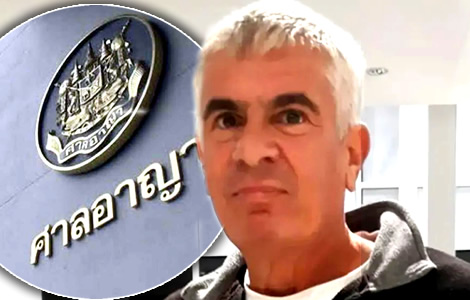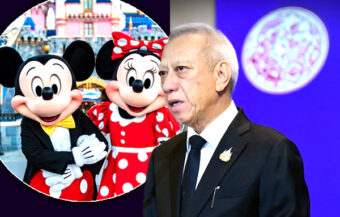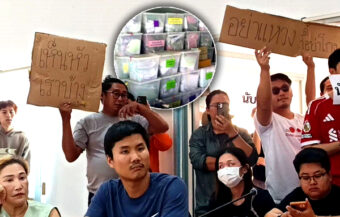Australian journalist Murray Hunter faces a bizarre criminal defamation trial in Thailand over posts on a Malaysian government agency. The case has drawn global attention, sparked outrage from press freedom groups and highlighted Thailand’s controversial defamation laws, which have long been used to silence whistleblowers.
A 54-year-old Australian journalist and Southeast Asia expert faces a criminal defamation trial in Bangkok on December 22, following his shock arrest in September while boarding a plane to Hong Kong. Bizarrely, he is being prosecuted by Thai authorities for allegedly defaming a Malaysian government agency, despite his longstanding criticism of Malaysian institutions. The case has sparked condemnation from rights groups and journalist organisations, including the respected Foreign Correspondents’ Club in Thailand, which warned that it damages Thailand’s international reputation and press freedom standing. The trial is set to draw unwanted attention to Thailand’s widely criticised criminal defamation system.

An Australian journalist and academic faces trial in Thailand for alleged criminal defamation against the Malaysian government. Murray Hunter, who lives in Hat Yai, southern Thailand, was charged after posting four critical articles on his Substack blog in April 2024.
The articles accused the Malaysia Communications and Multimedia Commission (MCMC) of abusing its regulatory powers, censoring websites critical of the government, and holding a conflict of interest in its leadership.
Hunter was arrested on September 29 at Bangkok’s Suvarnabhumi Airport while attempting to board a flight to Hong Kong. Thai police detained him overnight and released him the following day on bail of ฿20,000. His passport was seized, and he is prohibited from leaving Thailand pending the outcome of legal proceedings. The case is unusual for Southeast Asia because it involves a cross-border criminal defamation complaint.
Complaint filed with Bangkok police by Malaysian agency against Hunter for alleged journalistic slander
The complaint originated from the MCMC, which accused Hunter of posting “slanderous” claims. His Substack articles suggested that the commission acted beyond its legal authority and was politically influenced by the Pakatan Harapan centre-left government headed by Prime Minister Anwar Ibrahim.
Additionally, Hunter alleged that the commission and Malaysian police attempted to intimidate the public. The MCMC categorically rejected all these allegations.
In Malaysia, a civil defamation case filed by the MCMC has already been decided in the commission’s favour. Hunter said he was unaware of this ruling. Later, Thai authorities upgraded the complaint to criminal defamation, carrying a maximum two-year prison sentence or a ฿200,000 fine. The equivalent fine is approximately $6,173. The Australian is scheduled to stand trial in Bangkok on December 22 2025.
Hunter calls the case surreal and warns Thai laws can be used to silence journalists across the region
Hunter told This Week in Asia that the case felt “surreal.” He said the prosecution appeared designed to silence him and warn other journalists in the region. Furthermore, he stated reporters could be arrested in Thailand based on complaints from foreign governments. Hunter described the charges as “malicious and often vindictive.”
Thai Lawyers for Human Rights (TLHR) described the prosecution as a “transnational SLAPP case.” SLAPP, or Strategic Lawsuits Against Public Participation, refers to legal actions meant to intimidate critics rather than achieve a legitimate legal outcome. TLHR said Hunter was targeted to burden him with legal costs and to deter journalistic reporting.
The Foreign Correspondents’ Club of Thailand said Hunter’s case illustrated how Thailand’s criminal defamation laws can be weaponised. It noted that courts rarely dismiss such complaints and are burdened with thousands of pending trials. Consequently, the club called for the charges to be dropped immediately.
Hunter’s case is believed to be the first instance of Thai criminal defamation law being used against a journalist at the request of foreign authorities. Rights activists have long criticised Thailand for participating in a “swap mart” system, cooperating with neighbouring countries to pursue both foreign dissidents on Thai soil and Thai critics abroad.
Phil Robertson says case shows Thai law being exploited to repress journalists and foreign media freedoms
Phil Robertson, director of Asia Human Rights & Labour Advocates, described the case as “blatant transnational repression.” He said Thai police and prosecutors allowed Malaysian authorities to exploit the legal system against Hunter. Robertson warned that the case could damage Thailand’s reputation for media freedom if prosecutors continue.
Hunter’s Substack posts in April 2024 focused on the MCMC’s regulatory conduct. He said the commission blocked websites critical of the government. He also alleged the MCMC chair had conflicts of interest. In response, the MCMC said the accusations were “baseless.”
After his arrest, Hunter spent a night in detention before being released on bail. His passport remains in Thai police custody, limiting his travel. Hunter told The Asia Sentinel that the MCMC had “conned the Thai police” into applying criminal defamation laws against him. He added that journalists in Thailand are at risk if foreign authorities seek Thai assistance for prosecutions.
The case drew immediate attention from legal and rights groups. TLHR described the prosecution as a rare application of Thai law for foreign purposes. The organisation noted that criminal defamation in Thailand has mostly been applied domestically. Hunter’s case, therefore, represents a significant new precedent.
Cross-border case in Southeast Asia raises concerns about legal precedent and journalist risk
Observers said the cross-border nature of the prosecution is unusual in Southeast Asia. Typically, one country does not request criminal action against a journalist in another country. In this case, Malaysian authorities coordinated with Thai police to pursue charges. Legal analysts called the proceedings complex and unprecedented.
Hunter remains free on bail in Thailand while awaiting trial in December. If convicted, he could face two years in prison or a ฿200,000 fine. Meanwhile, the case continues to attract scrutiny from media organisations and human rights groups across the region.
The Foreign Correspondents’ Club of Thailand said the case highlights vulnerabilities in the criminal defamation system. It emphasised that Thailand’s courts are tied up with thousands of minor or frivolous complaints. Therefore, the prosecution risks setting a precedent for using defamation laws to suppress criticism beyond domestic borders.
Hunter’s articles claim political influence and censorship by Malaysian commission affecting the public
Hunter’s reporting on the MCMC alleged political influence and censorship. The articles claimed the commission acted beyond its legal authority and intimidated the public. The Malaysian commission denied all claims. Furthermore, the civil defamation ruling in Malaysia occurred without Hunter’s knowledge.
Observers say the case could affect journalism throughout Southeast Asia. Cross-border complaints may create uncertainty for reporters covering foreign regulators. The prosecution is now closely monitored by rights organisations and media associations. They noted that the case could shape future reporting practices.
Hunter said the legal proceedings were stressful and complicated. He explained that he had no prior knowledge of the Malaysian civil defamation case. He highlighted restrictions on his movement because of his seized passport. Hunter said the criminal defamation complaint in Thailand is unusual in the region.
Phil Robertson stated the case illustrates the potential risk to journalists in Thailand from foreign influence. He called on the Ministry of Foreign Affairs to intervene. He warned that Thailand’s international standing on media freedom could suffer if the prosecution proceeds.
TLHR warns foreign defamation cases in Thailand could set concerning precedent for press freedom
TLHR said Hunter’s prosecution involved foreign authorities seeking legal redress in Thailand. The lawyers emphasised that this is a rare and unprecedented use of Thai law. They warned that such applications could have long-term implications for press freedom.
The Organic Act on Anti-Corruption (No.2), BE 2568, was passed in Thailand in 2025. It strengthened protections for whistleblowers and promoted public participation in anti-corruption work.
The government said the law aims to prevent misuse of legal action. However, it remains unclear whether the act applies to foreign defamation complaints.
Hunter’s case has prompted commentary on Thailand’s criminal defamation framework. Analysts said the laws allow complaints with minimal evidence. Courts are often overloaded, delaying proceedings for months or years. Observers noted that criminal defamation charges can be applied selectively and against journalists critical of governments or corporations.
Commission denies Hunter’s claims, while the civil case did not directly involve him in Malaysia
The MCMC rejected all claims by Hunter, stating that the commission acted within its authority. It also rejected accusations of political influence. In Malaysia, the civil defamation ruling confirmed defamation but did not involve Hunter directly, according to him.
Hunter’s trial opening next month will determine whether Thailand’s courts uphold the charges. Meanwhile, he remains free on bail under restrictions. His passport remains with Thai authorities, preventing international travel.
Rights groups have stressed that the case may set a precedent for cross-border defamation actions in the region. TLHR and media associations have said the prosecution is being watched closely. They stated the case could influence how journalists cover foreign regulators.
Observers said the case demonstrates a novel use of Thai law. Usually, criminal defamation cases are domestic. Hunter’s prosecution shows Thailand can become a venue for foreign authorities to pursue complaints. Legal experts described this as a complex and unprecedented scenario in Southeast Asia.
Hunter remains under bail in Hat Yai as the trial draws regional and international scrutiny
Hunter continues to live and work in Hat Yai while awaiting trial. He remains under bail conditions and cannot leave the kingdom. Meanwhile, the case is generating ongoing coverage in regional and international media. Rights organisations continue to monitor developments.
Hunter has maintained that his work on Substack was journalistic. He said he was not aware of the Malaysian civil defamation ruling when posting the articles. The Thai authorities are prosecuting him solely under criminal defamation statutes.
Human rights organisations have emphasised the case’s potential impact on press freedom. They said it tests the boundaries of Thai legal authority in cross-border matters. Meanwhile, analysts noted that if convicted, Hunter’s case could influence future reporting practices across Southeast Asia.
Hunter highlights unprecedented restrictions and ongoing strain caused by a criminal defamation case
Hunter is particularly upset that the prosecution has created restrictions on his movement. He described the experience as unprecedented and stressful. The seized passport prevents him from travelling internationally. Furthermore, the legal proceedings have attracted sustained attention from journalists and rights groups.
The Foreign Correspondents’ Club of Thailand called the case a warning about the ease of weaponising criminal defamation laws. It said the prosecution highlights the strain on Thailand’s courts and the potential for legal abuse.
These cases additionally generate reams of paperwork and, in turn, run up high legal costs for defendants. At the same time, those involved must attend hearings often over extended periods.
Criminal defamation remains on the books in Thailand and can be abused by powerful interests locally
Notably, while criminal defamation has largely petered out in Western jurisdictions, it remains on the law books. Indeed, up to 160 countries still retain criminal defamation prosecution options.
However, in Thailand, it has certainly been abused, with actions often taken by plaintiffs with deep pockets or with influence. These prosecutions can be initiated with a complaint at a police station.
Significantly also, the police station does not have to be linked to the alleged defamation action. Therefore, many Thai politicians, influential people and business concerns will instigate them in local jurisdictions.
In turn, this makes the process even more difficult for the defendant.
People’s Party campaigns to repeal law while it continues to target journalists and NGOs in Thailand
The People’s Party has long campaigned on the basis of repealing the law broadly. However, it is often used by all sections of Thailand’s political elite and well-known public players as a tool of intimidation.
It has also in the past been used to target international reporters and non-governmental organisations (NGOs) in Thailand working on sensitive news reports and stories.
Indeed, to further make the situation more demanding and complex, lower courts have been known to side with the plaintiff or prosecution. Only at a later stage, and after waging an expensive appeal campaign, may a case be defeated. Another complication is that the legal process is in the Thai language, which offers differences from English in the interpretation of texts and contexts.
Australian arrested at Suvarnabhumi Airport. Held overnight on defamation complaint from Malaysia
Defiant Rangsiman Rome warns he’s not just fighting a defamation case but for the future of Thailand
Hunter’s articles in April 2024 focused on the MCMC’s alleged overreach. He claimed the commission blocked websites critical of the government. He also alleged that the chair of the MCMC had a conflict of interest. The MCMC rejected these claims, saying its actions were lawful and justified.
The trial in December will determine whether Thailand’s courts uphold the criminal defamation charges. Hunter faces imprisonment or a substantial fine. Meanwhile, he remains on bail, under travel restrictions, and continues to reside in Hat Yai.
Certainly, the case also puts Thailand in the glare of international attention and highlights cooperation between Southeast Asian governments and authorities.
Join the Thai News forum, follow Thai Examiner on Facebook here
Receive all our stories as they come out on Telegram here
Follow Thai Examiner here
Further reading:
Australian arrested at Suvarnabhumi Airport. Held overnight on defamation complaint from Malaysia
Leader of deadly scam gang in Cambodia and henchmen still at large with 4 more Thais arrested
Police in Cambodia close in on fake scam loan app leadership after family murders in Samut Prakan
Cambodian cybercrime industry run by Chinese criminals could be generating up to 38% of its GDP
Debt and ฿1.7 million loss to scammers drive man to murder his wife and two sons in Samut Prakan
Loan shark arrested in Nonthaburi for bullying a borrower charged an annual interest rate of 730%
Bank of Thailand governor gives veiled warning to voters on the danger posed by populist policies


















